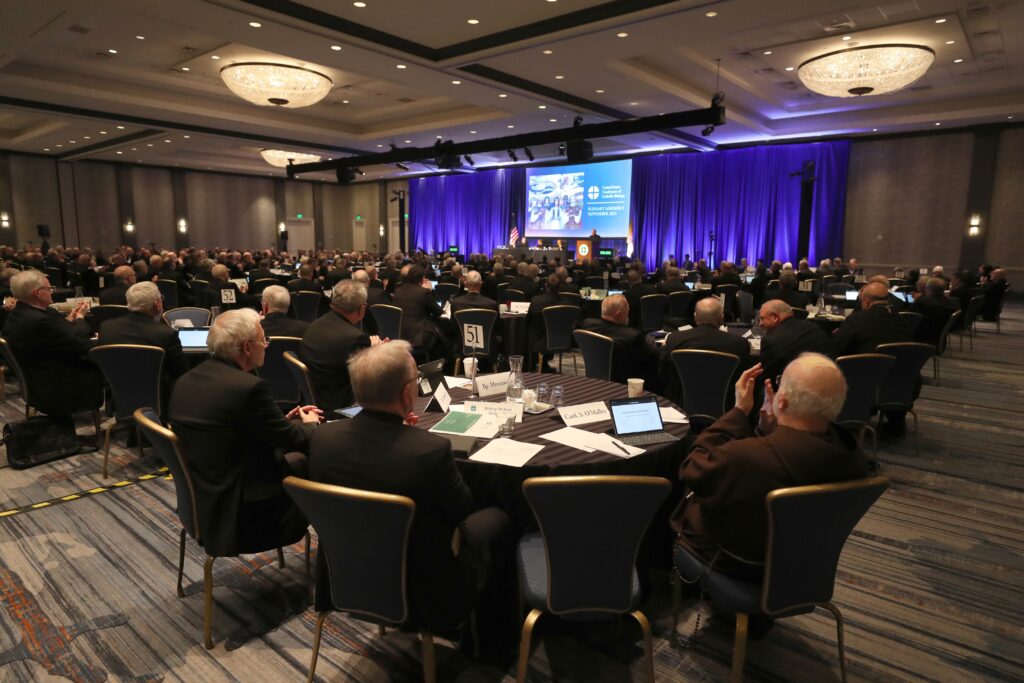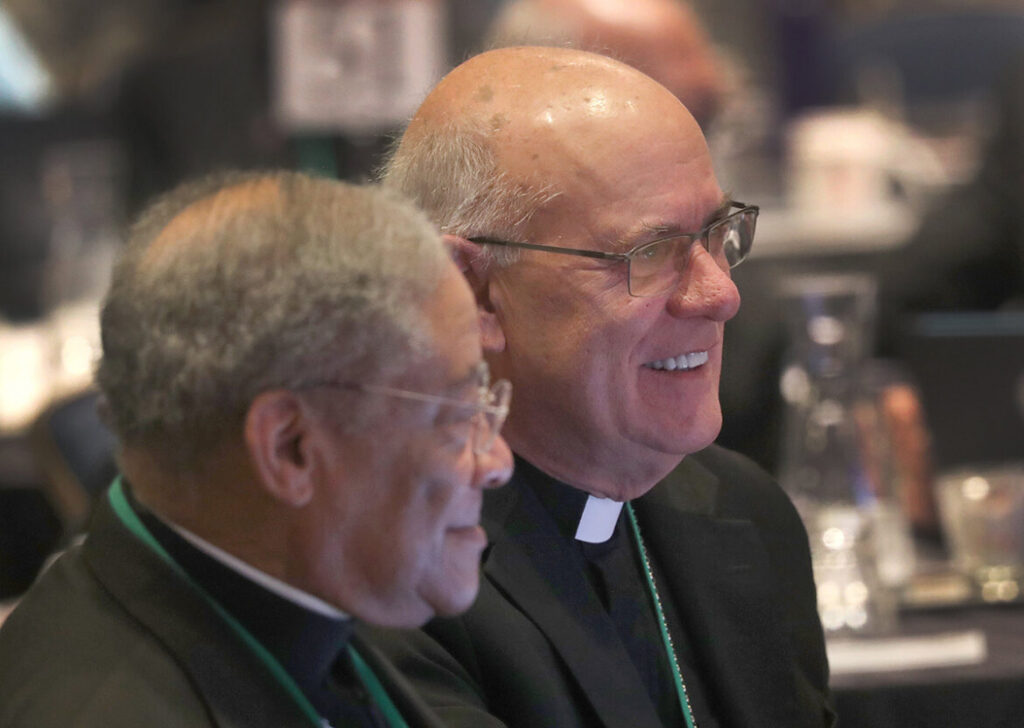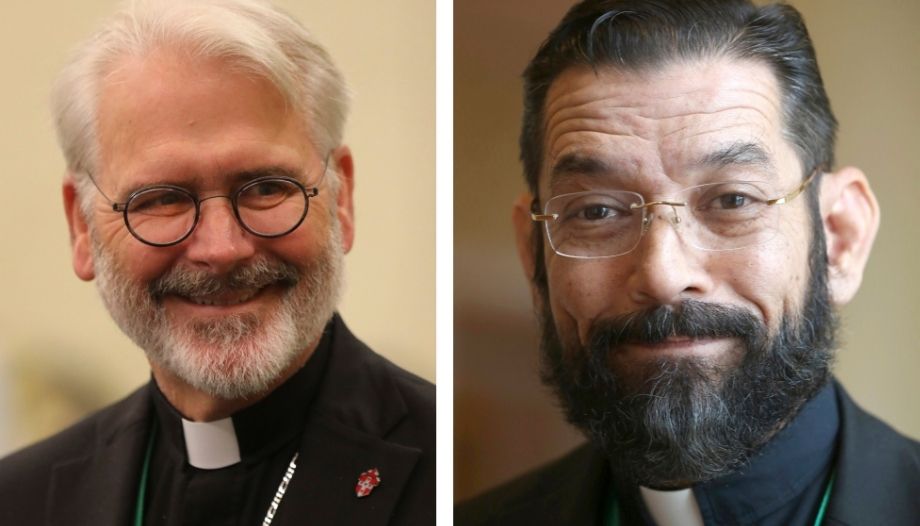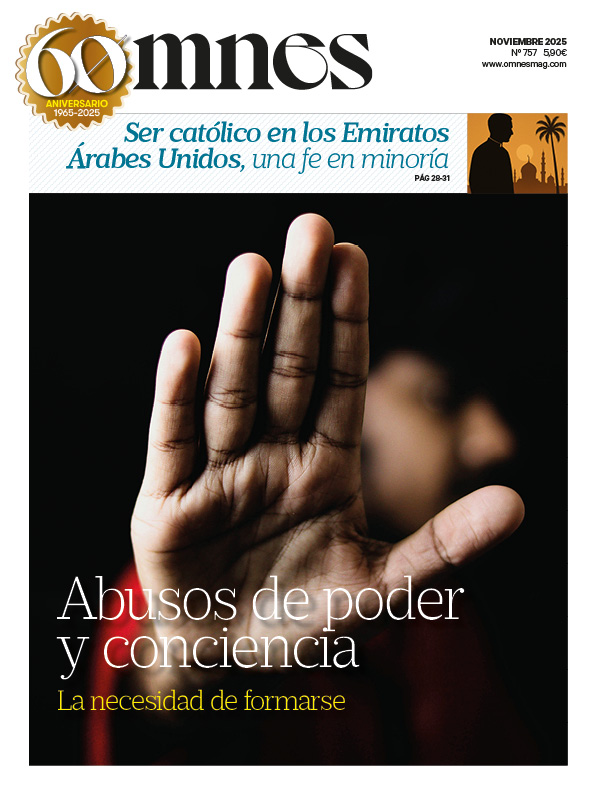- Julie Asher, Baltimore (USA), OSV News
From the opening to the close of the Nov. 11 session, the topic of immigration figured prominently for much of the first day of the U.S. bishops' fall plenary assembly in Baltimore, and it has continued to mark the meeting. The day's agenda included elections for the new leadership of the United States Conference of Catholic Bishops (USCCB), and a report on the immigration situation in the United States under the Trump Administration.
Also taking place are preliminary presentations on possible revisions to the bishops« »Ethical and Religious Directives for Catholic Medical and Health Care Organizations." And the presentation of a new English version of the Bible for the United States to be published in 2027. It was reported that a Spanish translation of the New Testament will be available by Ash Wednesday 2026.
The bishops also approved a local diocesan initiative to present the cause of canonization of Jesuit Father Richard Thomas (1928-2006), who for more than 40 years directed various ministries to the poor in El Paso, Texas, and Ciudad Juarez, Mexico.
New president and vice-president with Leo XIV as pope
The bishops elected Archbishop Paul S. Coakley of Oklahoma City as president of the USCCB and Bishop Daniel E. Flores of Brownsville, Texas, as vice president of the U.S. bishops' conference.
The 2025 elections have marked the first leadership change in the conference since Pope Leo XIV, the first U.S.-born pontiff, began his Petrine ministry in May.
They will continue to support migrants
The day began with a message from the bishops to Pope Leo XIV at the start of their Nov. 10-13 meeting. The U.S. bishops told the Pope that they “will continue to support migrants and defend the right of all to freely practice religion without intimidation.”.
“As pastors in the United States, we face an increasingly pervasive worldview that often conflicts with the Gospel mandate to love our neighbor,” they wrote. “In cities across the United States, our migrant brothers and sisters, many of whom are Catholic, face a culture of fear, hesitant to leave their homes or even attend church for fear of being harassed or detained.”.
“Holy Father, know that the bishops of the United States, united in our concern, we will continue to stand with migrants and defend the right of all to worship without intimidation,” the bishops wrote. “We support secure and orderly borders and law enforcement actions in response to dangerous criminal activity, but we cannot remain silent in these difficult times while the right to practice religion and the right to due process are undermined.”.
There are several flashpoints across the country over tensions generated by the Trump Administration's hard-line immigration policy, with regular protests in front of several local Immigration and Customs Enforcement (ICE) offices.

Detainees are denied sacraments
Among the concerns of Catholics about how this policy is being implemented in U.S. cities is the denial of sacraments to detainees, an issue that has been highlighted most notably at an immigration processing center west of Chicago. On November 1, All Saints' Day, a Catholic delegation - which this time included clergy, religious and lay people, as well as an auxiliary bishop of Chicago - was prevented, for the second time in three weeks, from bringing the Eucharist to Catholics detained there.
The issue of the possibility of immigrants detained by ICE receiving the sacraments «is one of our primary concerns,» Bishop Kevin C. Rhoades of Fort Wayne-South Bend, Indiana, said Nov. 11 during a noontime press conference at the bishops' plenary. The bishop is chairman of the USCCB's Committee for Religious Liberty.
According to him, the bishops have focused on “the right of the Church to provide charitable services to immigrants.”.
«We didn't really foresee what we're facing now with detention centers, but as soon as we became aware of it, it became our top priority,» he said.
«It's heartbreaking,» Bishop Rhoades added, “when you think of the suffering and especially those who have been detained, separated from their families...they need spiritual support in this, and they need the sacraments.”.
“You are not alone” (You are not alone, you are not alone).
In an afternoon presentation, Bishop Mark J. Seitz of El Paso, Texas, outgoing chairman of the bishops“ migration committee, said the Trump administration's ”unwavering commitment“ to mass deportation, as well as ”restricting legal immigration“ and deportations to ”third countries that are completely unknown to them,“ make it clear that ”this is just the beginning.".
Bishop Seitz said the migration committee, its staff and mission partners are working on an initiative entitled “You are not alone.” It will focus “on four thematic areas of ministry, family and emergency support, accompaniment and pastoral care, communication and Church teaching and, fourthly, solidarity through prayer and public witness.”.
A glimmer of hope with religious worker visas
However, he offered a glimmer of hope regarding visas for religious workers, a process stalled since the spring of 2023. He stated that he felt
“very optimistic” that efforts to resolve visa backlogs for religious workers, which were moving forward thanks to possible new legislation and dialogue with the current presidential administration.
Close elections
In a close race among ten potential candidates, Archbishop Coakley was elected president on the third round of balloting in a runoff with Bishop Flores. The U.S. bishops then elected Bishop Flores in the first round of the vice-presidential election.
Their three-year terms begin at the conclusion of this plenary assembly in Baltimore. They succeed, respectively, Archbishop Timothy P. Broglio of the Archdiocese for the Military Services of the United States and Archbishop William E. Lori of Baltimore, who will complete their three-year terms at the conclusion of the fall assembly.
Prior to the election, Archbishop Broglio, as outgoing USCCB president, delivered his final presidential address. He emphasized the need to “convince people to listen to each other” in the midst of polarization.
«We must draw on our unity to illustrate that civil dialogue is not only possible, but is the most authentically humane way forward,» he said.
Nuncio Pierre: teachings of the Vatican C.year II
Cardinal Christophe Pierre, Apostolic Nuncio to the United States, then addressed the USCCB. His remarks at this year's plenary were his first as a representative of Pope Leo XIV.
«Where have we come from and where are we going?» he asked, pointing to “a guiding light: the teachings and vision of the Second Vatican Council.” He emphasized that Vatican II “remains the key to understanding what kind of Church we are called to be today, and the reference point for discerning where we are headed.»
Day 12: Pastoral message on immigration
Immigration again took center stage yesterday at the fall plenary assembly of the U.S. bishops in Baltimore. The prelates approved a “special pastoral message on immigration,” expressing “our concern for immigrants,” with ideas reflected above.
The statement has come at a time when a growing number of bishops have recognized that some of the Trump administration's immigration policies risk presenting the Church with practical challenges in administering pastoral support and charitable initiatives, as well as challenges to religious freedom.
In other business, the bishops elected a new secretary for their conference: Bishop Kevin C. Rhoades of Fort Wayne-South Bend, Indiana.

Other issues
The bishops also overwhelmingly approved an updated version of their guiding document on Catholic health care, with substantial revisions that include explicit prohibitions against so-called “gender-affirming” care. They also gave the green light to hold the 11th National Eucharistic Congress in the summer of 2029.
Regarding the special statement on immigration, Archbishop Richard G. Henning of Boston told OSV News in an interview that the feeling that “we have to say something” and show solidarity with immigrants has been “coming up naturally among the bishops.”.
“We are pastors,” he said. “We care about the people we serve, and what we hear from them is fear and suffering. So it's hard not to want to respond to that.”.
In releasing the text of the statement late in the afternoon, a press release from the United States Conference of Catholic Bishops (USCCB) indicated that it was “the first time” in 12 years that the bishops“ conference had ”resorted to this particularly urgent way of expressing itself as a body of bishops. The last statement, issued in 2013, was in response to the federal government's contraceptive mandate.".
————-
- Julie Asher is senior editor of OSV News. Kate Scanlon, Lauretta Brown and Gina Christian of OSV News contributed to this article.
- This information and the Pastoral Statement on Immigration were originally published in OSV News and are available for your reference at here.
————-








